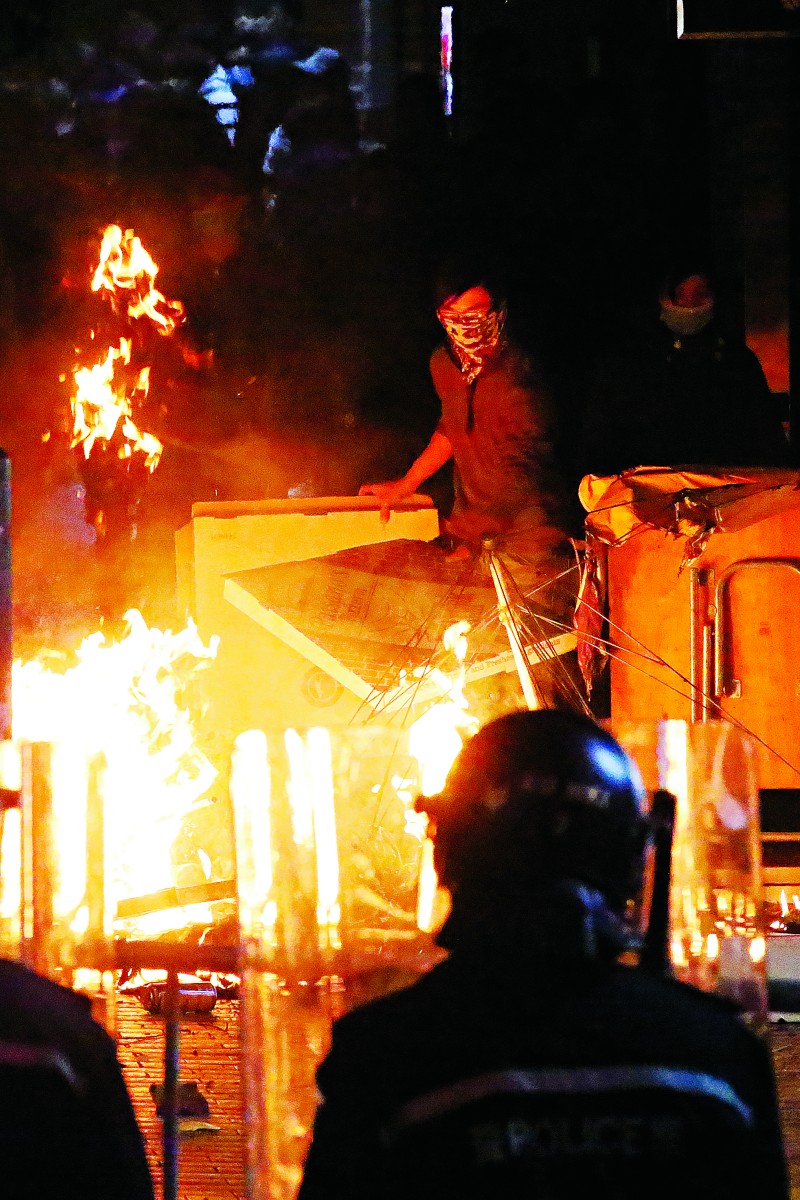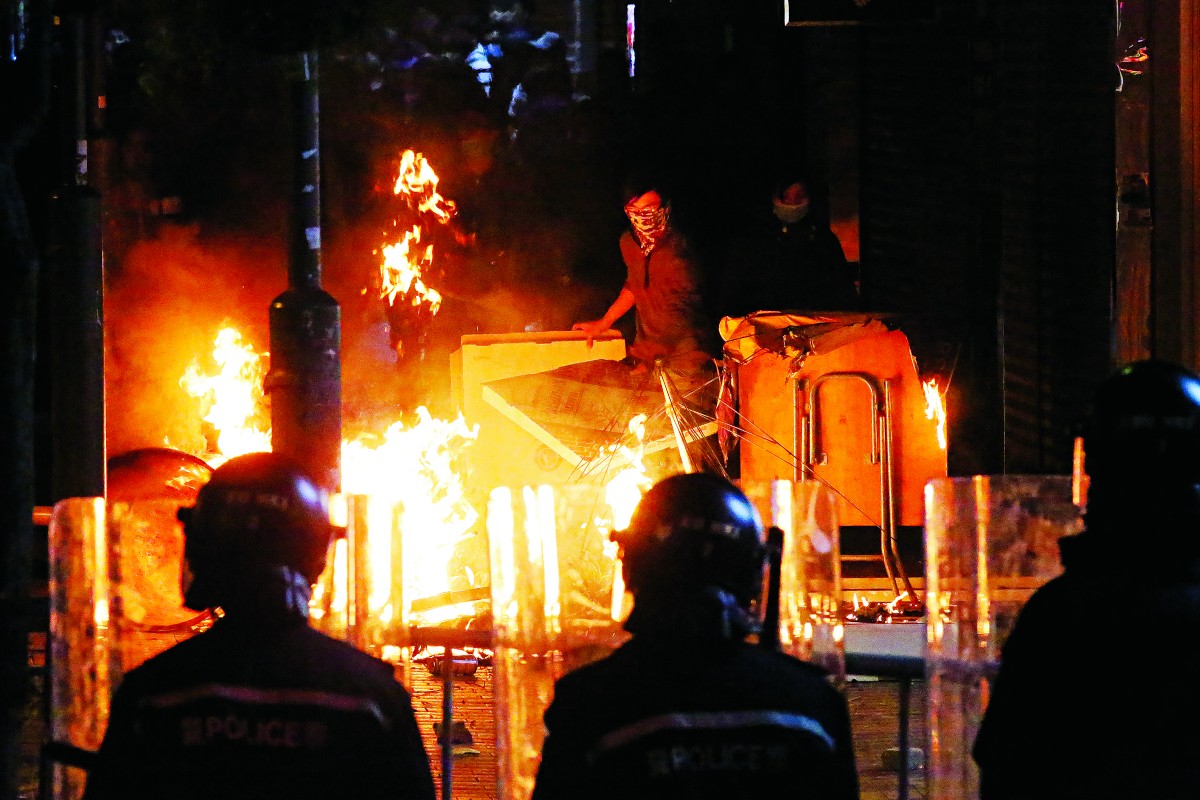
The Feb 8 Mong Kok #FishballRevolution broken down into bite size pieces
The riot that broke out last week in Mong Kok seemed to be sparked by people passionately defending street food stalls, but some say it's more to do with a loss of culture and identity than just feeling hungry
 Police confront rioters in Mong Kok during clash over illegal food stalls during the three-day Chinese New Year holiday.
Police confront rioters in Mong Kok during clash over illegal food stalls during the three-day Chinese New Year holiday.News
A festive start to the Year of the Monkey descended into a night of mayhem in Mong Kok last week as radical localists vented their frustration on the issue of hawkers' livelihoods.
The overnight confrontation with the police lasted for more than 10 hours, with fires erupting and repeated clashes between protesters and law enforcement officers.
Hawkers said they were not involved at all in the protests.
The unlicensed vendors had enjoyed a decades-long tradition of being on the streets during the first few days of the Lunar New Year.
By 8.30am last Tuesday, 124 people had been sent to hospital with injuries. The streets were littered with scattered debris and charred black marks where fires were lit in at least six spots, overturned rubbish bins; and jagged pavements with their concrete exposed, after protesters had prised the bricks loose to use against the police.
Rioters trashed a taxi, and also attacked a police van while officers were still inside.
The number of protesters was somewhere between 400 and 500 people, said government sources.
The only police officers at the scene in the beginning - mainly traffic cops without riot gear - were surrounded by the crowd. When one of their colleagues fell to the ground and continued to be assaulted, a police officer fired two shots into the air at around 2.05am.
Staff reporter
Issues
Decades-old tradition
The spark for the rioting in Mong Kok on the first day of the Lunar New Year and a subsequent incident in Tuen Mun was government enforcement action against hawkers selling street food - a Lunar New Year tradition going back decades.
More than 40 years ago, food hawkers would set up stalls during this period because many shops were closed. There weren't many convenience stores back then; the only shops that were open were the ones that sold Lunar New Year food items.
Food and travel writer Chan Chun-wai, 45, fondly remembers eating food from hawkers who set up shop during the first three days of the Lunar New Year.
"At home there wouldn't be much to eat except for those auspicious, expensive dishes like braised oysters, steamed fish and whole chicken," Chan says. "So it was only around this time of year that my parents would let us kids out to eat street food.
The hawkers would set up in an open area and bring out tables and stools. We'd get things like offal, braised fish balls with pig skin, and cart noodles, and dine alfresco. This only happened for three days because restaurants would reopen on the fourth day."
Not all street food hawkers were Chinese, Chan adds, recalling his first taste of satay was from Indonesian street stalls and pho from Vietnamese ones.
"Living in public housing estates, we didn't have much exposure to other cuisines, so for me it was my first time trying them. There were also pancake stalls, and traditional candy and coconut wraps, where a honeycomb-shaped white wafer was dressed with sugar, coconut, maltose and sesame and wrapped in a thin pancake," he says.
Fewer hawkers
There are fewer hawkers these days, given that the government stopped issuing new hawker licences in the early 1970s and started phasing out existing ones by prohibiting licence holders from selling them, meaning they could only be passed on within their families.
The authorities also began cracking down on illegal hawkers to safeguard hygiene and prevent nuisance, according to the Food and Environmental Hygiene Department website.
The government's attempt to stop illegal hawking last week is not new. A night market used to be held during Lunar New Year at Peiho Street and Kweilin Street in Sham Shui Po, where hawkers not only sold snacks but also second-hand clothing and used electronic goods. During the Lunar New Year in 2013, the department closed down the night market relatively peacefully. Chan says this sparked a debate on whether hawkers, illegal or not, should be allowed to operate during Lunar New Year. People were divided on the issue, as some enjoyed the opportunity to taste nostalgic street food, while others disliked the mess and smell the food hawkers created.
"Previously the authorities weren't so strict, and hawkers could make a bit of money and made people happy," says Chan. "But I don't understand what happened on Monday evening. When you think about the big picture, what about people in the New Territories who set off fireworks? Why don't people crack down on them? And the subdivided flats? And the giant piles of garbage left over from the New Year fair in Victoria Park? That's the real problem. Why be so hardline on these hawkers? Did someone complain?
"When it comes to Lunar New Year," Chan says, "One has to be more sensitive in handling these issues because it has now blown up into a big incident that paints Hong Kong in a bad light."
While the government has plans to introduce food trucks to the city, Chan thinks it would be better if it thought about regulating street-food vending instead so it can continue. "To start a food truck you need at least HK$600,000. Not everyone has that kind of money. When people fled the mainland to come to Hong Kong, many started off selling food in street stalls. That's nothing to be ashamed of. People who eat street food will also eat at high-end restaurants like Amber and Caprice. They just want to eat good food."
Loss of culture and identity
But the love for street food is about more than just hunger - it's about the cultural identity of the city, which many feel is fading.
Charmaine Mok is a host at Little Adventures in Hong Kong, a company that takes tourists on food tours to places like Sham Shui Po.
"We tell people about the history of street stalls and the visitors tell us they're sad to see the practice of street food dying out. They ask us why the government is so against the street food culture when it's becoming so popular elsewhere and Hong Kong has such a great tradition of humble street food," she says.
In the last year and a half, Mok says, there has been zero tolerance for illegal food hawkers.
"Hongkongers feel this 'fishball revolution' is not just about street food, it's about losing their culture, and about losing a part of their identity. And there's not much of the culture left so they feel like they have to grapple onto whatever is left and hang onto it."
Both she and Chan believe more Hongkongers will now make a conscious effort to support local street-food vendors. "It may create a movement as an outlet to push back," says Mok.
Fishballs trending worldwide
A spike in fishball searches online has been recorded as global interest turns to the Mong Kok riot, with Google Trends showing a leap in interest over the fast food.
After the protest-turned-riot last week, the world was left scratching their heads as to what could have caused such unrest.
Britain's The Guardian newspaper led with the headline "Is Hong Kong really rioting over fishball stands?" The food entered headlines from Italy to the United States, where it was likely unfamiliar to many readers.
Singapore and the Philippines were the sources of much of the interest, where the food is a popular snack, and many web searches revolve around recipe ideas in those countries.
But a rise in searches for the word "fishball" was also seen as people looked for an explanation of the term.
Since the start of February, searches for "fishball" have jumped 34 per cent and "fish ball" 26 per cent, according to Google Trends.
The food is rarely offered outside Asia.
But in Hong Kong the white lumps can be savoured floating in curry sauce, on a skewer, or doused in shark's fin soup.
And as every Hongkonger knows, the snack is part of life in the foodie city.
Staff writer
Voices
"Society should not find excuses for a small batch of young people."
Chief Secretary Carrie Lam Cheng Yuet-ngor
"If Chief Executive Leung Chun-ying told the press to ask the organisers the motives behind the protest, the press should ask him because he is the end culprit. Which Hong Kong leader before him would take action against hawkers on the first day of the Lunar New Year?"
Localist campaigner Baggio Leung Chung-hang, convenor of post-Occupy group Youngspiration
"I suspect the hawker issue was just an opportunity to vent other emotions ... you can see the hawker issue is in no way big enough to warrant such a disproportionate reaction - the anger and hatred against the police you see is a build-up. But to instigate such actions, there must be a ripe environment."
Political analyst Ivan Choy
"If I am going to lose money this year, the demonstrators definitely helped."
Leo Chan, a hawker who was selling ceramic cups on Sai Yeung Choi Street South on the first day of the Lunar New Year
Bonus Point
5,644
Number of cooked food hawker licences in Hong Kong's urban area as of December 2014, according to the Food and Environmental Hygiene Department
WORD WATCH
Identity (noun)
Meaning: who or what a person is, or their qualities and beliefs
Use it: Traditions, religious practices and food can all contribute to establishing a cultural identity.
Identify (verb)
Meaning: associate with something or be close to
Use it: His mum is from the US and his dad is Japanese, but he identifies himself as a Hongkonger because he was born here and has never lived anywhere else.
Identification (noun)
Meaning: the process of telling who someone is
Use it: The students in the class were each assigned a number for easier identification.